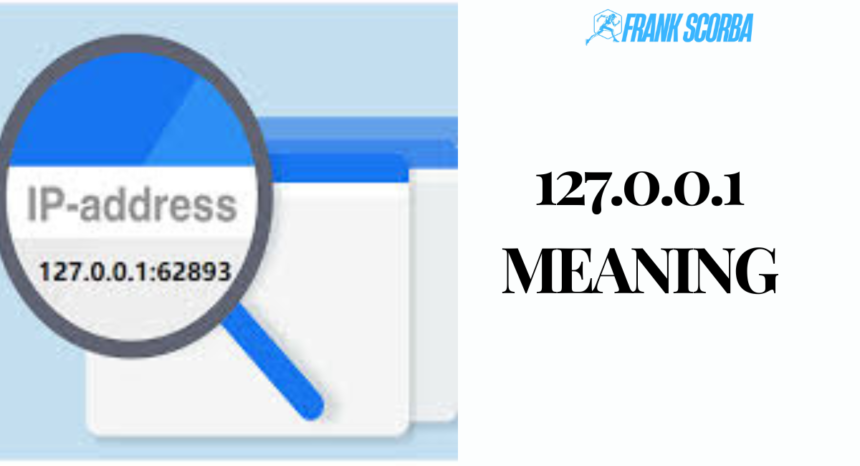In the vast world of networking and computer systems, IP addresses are a fundamental concept. Among them, the IP address 127.0.0.1 meaning stands out for its unique role and significance. Often referred to as the “loopback” address, this special IP plays a crucial part in network diagnostics and development. But what exactly is 127.0.0.1, and why is it so important? In this comprehensive guide, we’ll delve deep into the meaning of 127.0.0.1, its functions, and its implications in modern computing.
Understanding IP Addresses
What is an IP Address?
An IP address, or Internet Protocol address, is a numerical label assigned to each device connected to a computer network that uses the Internet Protocol for communication. It serves two primary purposes: identifying the host or network interface and providing the location of the host in the network.
The Different Types of IP Addresses
IP addresses are categorized into two main types:
- IPv4: The most common format, consisting of four decimal numbers separated by dots (e.g., 192.168.1.1).
- IPv6: A newer format designed to address the limitations of IPv4, using eight groups of hexadecimal digits separated by colons (e.g., 2001:0db8:85a3:0000:0000:8a2e:0370:7334).
The Loopback Address Explained
What is the Loopback Address?
The loopback address is a special IP address used to test network functionality. It allows a computer to communicate with itself over the network interface without actually sending data over an external network.
The Significance of 127.0.0.1
The IP address 127.0.0.1 meaning is the most commonly used loopback address. It belongs to the 127.0.0.0 network range, which is reserved for loopback purposes. When a device sends data to 127.0.0.1, it essentially sends the data to itself.
How Loopback Works
When you send a network request to 127.0.0.1, your network stack recognizes this as a request to the local machine. This request bypasses the physical network hardware and routes directly through the software stack. This process ensures that the data never leaves your computer, making it an essential tool for developers and network administrators.
Also Check:The Rise of Luxury FintechZoom: When Opulence Meets Innovation
Use Cases of 127.0.0.1
Network Troubleshooting
One of the primary uses of 127.0.0.1 meanings for network troubleshooting. If a network service is not functioning correctly, testing with 127.0.0.1 meaning can help determine if the problem lies within the local machine or elsewhere in the network.
Localhost
The term “localhost” is often used interchangeably with 127.0.0.1. It refers to the local machine that you are working on. When you access localhost in your web browser, you’re effectively accessing 127.0.0.1. This is useful for testing web applications and services before deploying them to a live server.
Software Development
Developers use 127.0.0.1 meaning to simulate network conditions and test software in a controlled environment. By directing traffic to the loopback address, they can ensure that their applications work correctly without relying on external servers.
Security Testing
Security professionals also use the loopback address for testing security measures on local machines. This includes verifying firewall configurations and intrusion detection systems in a safe and isolated manner.
Configuring Loopback Interfaces
On Windows
To configure loopback interfaces on a Windows machine, you can use the following steps:
- Open Command Prompt: Type cmd in the search bar and select Command Prompt.
- Add Loopback Adapter: Enter hdwwiz.cpl to open the Hardware Wizard. Select “Add Legacy Hardware,” then choose “Network Adapters” and “Microsoft” as the manufacturer. Select “Microsoft Loopback Adapter” and complete the installation.
On macOS
macOS systems generally have loopback interfaces pre-configured. However, you can verify and manage network settings through the Network Preferences pane:
- Open System Preferences: Click on the Apple menu and select System Preferences.
- Select Network: Choose the Network icon.
- Verify Interfaces: Check the list of network interfaces for the loopback adapter.
On Linux
Linux systems use the lo interface for loopback. To check the configuration, use the following command in the terminal:
bash
Copy code
ifconfig lo
This command displays information about the loopback interface, including its IP address (127.0.0.1).
Common Issues and Troubleshooting
Address Conflicts
Although rare, address conflicts can occur if 127.0.0.1 meaning is misconfigured or if there’s a problem with network settings. To resolve conflicts, ensure that 127.0.0.1 meaning is correctly assigned and that no other applications are interfering with its use.
Loopback Failure
If the loopback interface fails, it can indicate issues with the network stack or operating system. Restarting the network services or rebooting the machine often resolves these problems.
The Future of Loopback Addresses
IPv6 and Loopback
With the adoption of IPv6, loopback addresses have also evolved. The IPv6 equivalent of 127.0.0.1 meanings ::1. This address serves the same purpose as its IPv4 counterpart but is used in IPv6 environments.
Emerging Technologies
As network technologies continue to advance, the role of loopback addresses remains vital. They will continue to be essential for testing and debugging in increasingly complex network environments.
Conclusion
The IP address 127.0.0.1, commonly known as the loopback address, is a fundamental component of network communication and diagnostics. Its ability to route traffic back to the local machine without accessing external networks makes it an invaluable tool for developers, network administrators, and security professionals. Understanding how 127.0.0.1 meaning functions and how to configure it can greatly enhance your ability to troubleshoot and develop networked applications.
FAQs
1. What is the difference between 127.0.0.1 meaning and localhost?
127.0.0.1 meaning and localhost are essentially the same thing. localhost is a hostname that resolves to the IP address 127.0.0.1, allowing you to refer to your own machine in a network context.
2. Can 127.0.0.1 mean be used for external network communication?
No, 127.0.0.1 meaning is strictly for internal communication within the same machine. It does not route data to external networks.
3. How can I test if my loopback interface is working?
You can test the loopback interface by pinging 127.0.0.1 meaning from the command line. If you receive responses, the loopback interface is functioning correctly.
4. Are there any security concerns with 127.0.0.1?
Generally, 127.0.0.1 meaning is secure as it does not expose data to external networks. However, misconfigurations or vulnerabilities in local services could pose security risks.
5. How does IPv6 handle loopback addresses?
In IPv6, the loopback address is ::1. It serves the same function as 127.0.0.1 meaning but is used in IPv6 networks.







